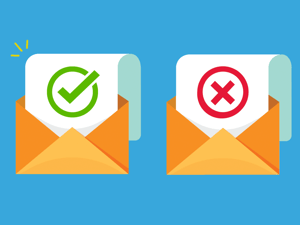A strong email is the best way to follow up after every sales call you make. Whether the call ended with you taking a job on or you got shot down by your prospect, a well-written email follow-up will allow you to end things on a positive, confident note.
Over the years, I’ve developed a really effective email formula to following up after a sales call with recruitment prospects. The process can be broken down into five basic steps - here’s what they are…
Step 1: Recap the conversation
 At the start of your follow-up email, include a couple of sentences that recap the conversation. A short summary is useful for a few reasons: It allows you to make sure there are no misunderstandings between you and your prospect and you can use it to remind yourself of what you discussed the next time you speak to them.
At the start of your follow-up email, include a couple of sentences that recap the conversation. A short summary is useful for a few reasons: It allows you to make sure there are no misunderstandings between you and your prospect and you can use it to remind yourself of what you discussed the next time you speak to them.
Your recap should not be a complete transcript of your conversation, just the key points of what you discussed (either a sentence or two or bullet points would work). Keep a positive tone here and don’t recap on any negatives from the call – this will just put doubt in your prospect’s mind about working with you.
Step 2: Add value with relevant content
This step is simple: Include some content that’s related to what you discussed over the phone so you add value to you conversation and develop your credibility as a top recruiter in your niche.
A smart way to tackle this step is to send some content that addresses any challenges they discussed with you on the phone. For example, if your prospect said they were unsure of what salary to offer for a role, send them a market-specific salary guide.
Where possible, send prospects your own content as this will help promote your brand as an industry leader. But if you don’t have anything relevant to send them, you can always share insights from other market leaders. This will show that you have your finger on the pulse of the market.
Step 3: Ask final questions
 The reality is, you don’t always get enough time to ask your prospects everything you want to during a call, so take opportunity to find out any missed bits of information in your email.
The reality is, you don’t always get enough time to ask your prospects everything you want to during a call, so take opportunity to find out any missed bits of information in your email.
In an ideal world, you’d skip this step. But if there are questions you still need to ask, there are ways you can pose them that won’t annoy your prospect.
The trick is not asking to many questions - you don’t want to interrogate your prospect through email. And keep the questions short and sweet; ideally they should be able to answer them with a ‘yes’ or a ‘no’.
Step 4: Clearly lay out next steps
This step is really important. By putting down in writing the things you agreed on the call, you create accountability both for yourself and your prospect for what happens next.
Make sure the steps you lay out are concise, clear and time specific. Clearly lay out when your prospect can expect to hear from you next and welcome them to get in touch with you any time, even if you’d agree there’s no opportunity to work together right now.
Step 5: Proofread your email
An often-overlooked step of a follow-up email is proof reading. It’s an important step, because if your prospect doesn’t fully understand what you’re trying to say in the email, you’ve just wasted your time – and your prospect’s.
Take the time to read what you have written carefully and pay special attention to spelling, punctuation and grammar to build professional credibility. Websites like Grammarly and Hemingway are brilliant for checking the quality of your writing, and this blog has some great tools that will help you improve the quality of your emails.
Triple check the dates, figures and contact details you’ve stated in the email. Even the slightest typo can totally derail any progress you’ve made and make you look unprofessional, so never rush through this final step.
If you’re sending a particularly important email or you’re just unsure about what you’ve written, ask someone to proofread the email for you. Once you hit the ‘send’ button, there’s no going back!
We're moving into a sales-driven market, so download the eBook below to get ten sales email templates that'll help you win business at every step of the sales process.
David Connolly
David is a Senior Growth Outreach Specialist at Firefish. After working as a 360 recruiter, he loves innovating recruitment with Firefish Software.




